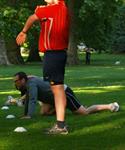Working in Fitness or Personal Training

Fitness Leaders are people who instruct and/or otherwise facilitate other people to undertake activities intended to improve or maintain individuals level of physical (and sometimes mental) well-being.
The job of being a Fitness Leader has changed greatly over the past few decades, and looks certain to continue changing.
In the mid 20th century, fitness leaders were fewer in number, and often just amateur fitness enthusiasts conducting exercise classes in a community centre or hall. Throughout the second half of the 20th century, public interest in fitness increased, as did the capacity of people in more affluent countries to pay people to help them improve their level of fitness.
Growth in interest, demand and economic potential has led the industry to develop in different ways in different countries. What was once dominated by amateurs and volunteers, has blossomed into an industry that employs people in a wide range of roles (eg. "Gym Managers", "Life Coaches", Personal Trainers, "Health Consultants", "Fitness Leaders", "Recreation Officers" etc.). Concerns over legal liability have made it important for these "professionals" and their employers to be protected against legal action from disgruntled clients.

Appropriate legal protection may be achieved through various means:
- By acquiring skills and knowledge which show an impeccable capacity to do the job.
- Insurance -A professional indemnity policy to protect against any impact from a law suit.
- Statements relating to Liability -Displayed notices or membership contracts which clients are clearly advised of limited liability prior to using any offered services.
- Registrations and Memberships-Joining an appropriate professional association and/or registering as a fitness leader under an accreditation scheme can provide an indication that the leader is maintaining professional standing.
CAUTION: Registration as a Fitness Leader alone may not provide adequate legal protection. Registration simply means you have satisfied what a government or industry body has determined as being required for their registration; but if the courts determine you were still not competent to have done something you may still loose a legal challenge.
What Do You Need to Be a Good Fitness Leader
- Quality training.
- Professional Indemnity Insurance.
- In some countries and some situations, it may be desirable to gain registration through an accreditation scheme.
You may often need to do one course to "qualify" for being registered or accredited as a fitness leader; and other courses to develop knowledge and skills that will enable you to do the best job, and offer employers things that your industry colleagues cannot match.
We offer a number of sport and fitness courses including:
Fitness Leaders Certificate (VRE004)
This course focuses on teaching the theory and practical skills needed to work successfully in the fitness field. It was developed by fitness leaders with experience in different countries, so it is globally relevant and can be adapted to any fitness context.
ACS fitness leader graduates will have developed scientific knowledge, problem solving skills and other attributes different to, and beyond a typical fitness accreditation certificate. As such, their capacity to learn from their experiences, read and understand technical literature, and advance their career position will be enhanced significantly.
Find out more - learn more
Our courses are studied by distance learning and can be started at any time.
If you need help in choosing a course to suit your career goals, or have any questions about a course or studying with ACS - get in touch with us today. You can phone us on (UK) 01384 442752 or (International) +44 (0) 1384 442752.
